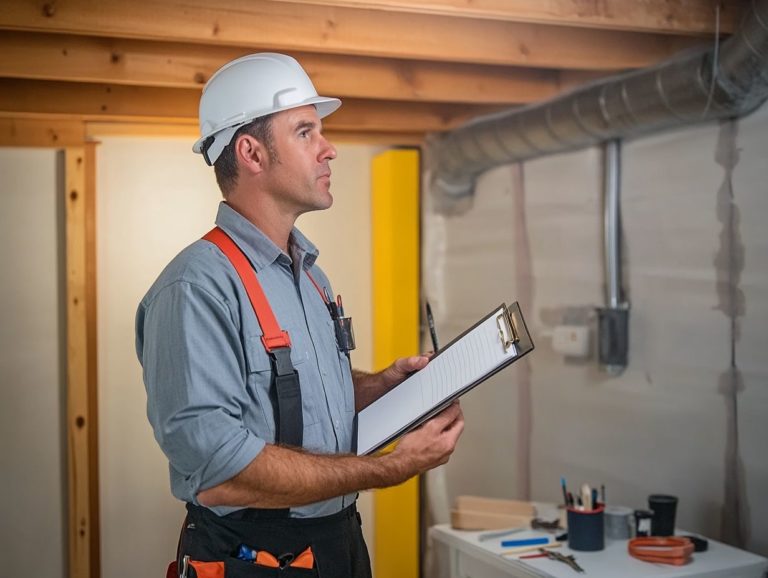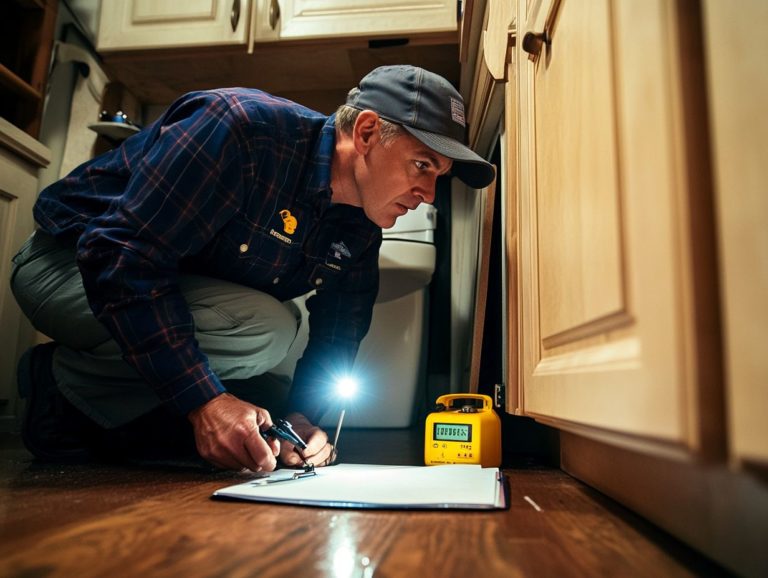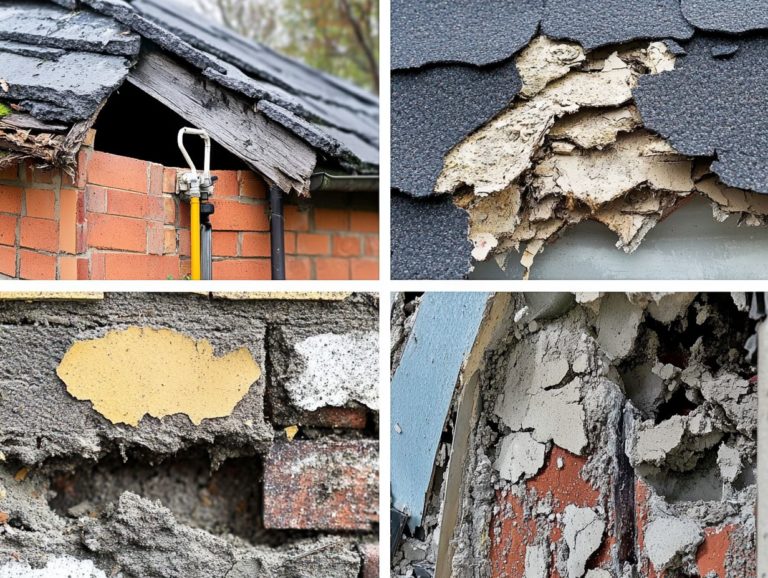How to Understand Home Inspection Terminology
Get ready to simplify your home inspection journey with this essential guide! Navigating the realm of home inspections can feel overwhelming, particularly with the specialized terminology and intricate details at play. This guide simplifies the essential concepts, covering everything from key terms to the critical areas that inspectors prioritize.
You ll discover how to interpret inspection reports with confidence and engage effectively with inspectors to ensure you re thoroughly informed. Whether you re a first-time homebuyer or seeking to enhance your knowledge, this resource provides you with the insights necessary to navigate the process with ease.
Contents
- Key Takeaways:
- Common Terms Used in Home Inspection
- Key Areas of a Home Inspection
- Interpreting Home Inspection Reports
- Tips for Communicating with Home Inspectors
- Preguntas Frecuentes
- Qu es la terminolog a de inspecci n de viviendas?
- Por qu es importante entender la terminolog a de inspecci n de viviendas?
- C mo puedo aprender sobre la terminolog a de inspecci n de viviendas?
- Cu les son algunos t rminos comunes de inspecci n de viviendas que deber a conocer?
- Hay t rminos de inspecci n de viviendas que a menudo se malinterpretan?
- Puedo pedirle a mi inspector de viviendas que explique la terminolog a durante la inspecci n?
- Por qu es importante entender la terminolog a de inspecci n de viviendas?
- C mo puedo aprender sobre la terminolog a de inspecci n de viviendas?
- Cu les son algunos t rminos comunes de inspecci n de viviendas que deber a conocer?
- Hay t rminos de inspecci n de viviendas que a menudo se malinterpretan?
Key Takeaways:

- Understand the basics: Home inspection is a visual evaluation of a home’s condition, identifying potential issues and providing valuable information for buyers.
- Know the terminology: Familiarize yourself with common terms used in home inspection reports such as “defects” and “recommendations” to better understand the findings.
- Communicate effectively: Communication with the home inspector is crucial. Ask questions and clarify terms to make informed decisions about the home.
What is Home Inspection?
A home inspection is a comprehensive evaluation of a property’s condition, encompassing essential systems like plumbing, electrical, and HVAC, which controls heating and cooling in a home. This process is crucial for homebuyers, sellers, and real estate professionals, as it unravels the complexities of the home inspection journey.
This inspection is your safeguard in making informed decisions during real estate transactions, helping you identify potential issues before you commit to buying or selling a property. Services like Home Inspection Associates, LLC provide a detailed assessment, covering everything from structural integrity to safety concerns, all while adhering to ASTM standards for accuracy and professionalism.
During a typical assessment, various components, including the roof, foundation, and access panels, are scrutinized meticulously for signs of damage or wear. Home inspection companies leverage their expertise to demystify complex technical jargon, ensuring you fully grasp the implications of their findings. To gain more insight, consider understanding the home inspection process for buyers.
For instance, recognizing the risks associated with aluminum wiring in older homes or understanding the criticality of proper ventilation can profoundly influence the safety and longevity of the property. Therefore, a thorough home inspection not only protects your financial investment but also brings peace of mind to everyone involved.
Common Terms Used in Home Inspection
Grasping the common terminology used in home inspection is vital for homebuyers, sellers, and real estate professionals. Understanding the home inspection report not only enhances communication but also empowers you to make informed decisions.
A well-curated glossary effectively bridges the gap between technical jargon and everyday language, ensuring that everyone involved is aligned and fully understands the nuances, including the importance of home inspections, throughout the home inspection process.
Definitions and Explanations
A glossary of terms related to home inspections is essential for you as a homebuyer or seller. It provides definitions and explanations that illuminate the various facets of the home inspection process, ensuring you are well-informed during real estate transactions. For a deeper insight, consider understanding the basics of home inspections.
With a grasp of essential phrases, you can navigate the complexities of property evaluations with greater confidence. For instance, understanding what an ‘HVAC system’ entails underscores its significance in creating a comfortable living environment.
Becoming familiar with ‘air conditioning’ systems equips you to better evaluate a property s climate control capabilities while understanding ‘electrical current’ enables you to assess the safety and functionality of a home’s electrical system, crucial for preventing potential hazards.
Collectively, these insights empower you to make informed, strategic decisions during negotiations, enhancing your position in the real estate market.
Understanding these terms will empower you to make informed decisions quickly, ensuring you don’t miss out on your dream home!
Key Areas of a Home Inspection

Key areas of a home inspection cover important parts of a home, such as the HVAC system, plumbing, electrical systems, and structural integrity.
This overview is crucial for homebuyers and sellers.
By understanding these critical components, you’ll spot potential problems and can negotiate necessary repairs or adjust pricing.
What to Look for and Why
During a home inspection, pay close attention to the HVAC system’s functionality, the building’s structural integrity, and signs of water damage. These factors can greatly affect the property’s value and safety.
It’s essential to examine the electrical system and plumbing, as old wiring or plumbing problems can lead to costly repairs and safety risks.
If you’re a homebuyer, checking the roof’s condition is vital to avoid future leaks. For sellers, make sure all main appliances work well to attract buyers.
Evaluating insulation and ventilation is also important, as it reveals the property’s energy efficiency, further influencing buyer decisions. By focusing on these key areas, you ll gain valuable insights into the property’s health, enabling informed choices during the transaction.
Interpreting Home Inspection Reports
Interpreting home inspection reports can be challenging, especially for first-time homebuyers and sellers. To navigate this process, it’s helpful to learn about understanding the home inspection process, as these reports often contain technical jargon that requires careful scrutiny to assess the property’s condition and value.
A solid grasp of the home inspection process and the ability to decipher these reports is crucial for informed decisions in real estate transactions. Navigating this complexity can significantly influence your investment choices and outcomes.
Understanding the Language and Findings
Understanding the language and findings in home inspection reports is essential for you as a homebuyer or seller. It equips you with the knowledge needed to tackle any issues that arise during the inspection process, making it important to grasp the basics of home inspection reports.
Familiarity with common terminology can elevate your decision-making skills, allowing you to distinguish between major concerns and mere cosmetic wear and tear. For example, understanding home inspection reports that include terms like “structural integrity” and “water intrusion” should not be taken lightly; they signal potential long-term consequences if left unaddressed.
When you interpret notes regarding electrical systems or plumbing deficiencies, you can prioritize repairs effectively or negotiate better terms during the sale. By grasping these insights, you empower yourself to make informed choices, leading to a smoother transaction and greater satisfaction with your investment.
Tips for Communicating with Home Inspectors

Effective communication with home inspectors is essential as a homebuyer or seller. It ensures that your concerns are addressed and that the inspection process proceeds smoothly.
This not only enhances your understanding of the property’s condition but also highlights necessary repairs. By cultivating open dialogue, you and the inspector can navigate the complexities of home inspections and real estate transactions, making the experience smoother and more informed.
Schedule your inspection today to secure your dream home!
Effective Communication Strategies
Effective communication strategies during a home inspection can greatly enhance your experience. This is true whether you’re buying or selling a home.
By adopting practical approaches, you can foster a collaborative atmosphere that encourages open dialogue. It s crucial for you and the people involved to express concerns clearly and ask specific questions about any technical findings.
Engaging with the inspector gives you better insights and a more thorough understanding of potential issues. Utilizing visual aids or examples can also clarify complex details, making them significantly easier to digest.
Ultimately, establishing a connection builds trust, ensuring that everyone feels heard and informed. This trust is essential for making sound decisions as you move forward.
Preguntas Frecuentes
Qu es la terminolog a de inspecci n de viviendas?
La terminolog a de inspecci n de viviendas incluye los t rminos t cnicos utilizados durante el proceso. Esto abarca t rminos relacionados con la estructura, los sistemas y los componentes de una vivienda, as como las normas y c digos de la industria.
Por qu es importante entender la terminolog a de inspecci n de viviendas?
Entender la terminología de inspección de viviendas es crucial. Esto permite a los propietarios y compradores tener una comprensión clara de la condición de su hogar y comunicarse de manera efectiva con los inspectores. Para más información, consulta las diferencias en los tipos de inspección de viviendas.
C mo puedo aprender sobre la terminolog a de inspecci n de viviendas?
Puedes aprender sobre la terminolog a de inspecci n de viviendas de varias maneras. Investiga en l nea, asiste a seminarios o talleres, o habla con un inspector de viviendas profesional. Leer el informe de inspecci n y hacer preguntas sobre t rminos desconocidos tambi n es til.
Cu les son algunos t rminos comunes de inspecci n de viviendas que deber a conocer?
Algunos t rminos comunes incluyen cimentaci n (foundation), HVAC (calefacci n, ventilaci n y aire acondicionado), panel el ctrico, sistema de plomer a, tapajuntas del techo e aislamiento. Otros t rminos importantes son cumplimiento de c digos, integridad estructural y da o por agua.
S , algunos t rminos pueden ser confusos. Por ejemplo, “condici n utilizable” no significa que un sistema est funcionando perfectamente, sino que est trabajando como se espera en el momento de la inspecci n. Es importante aclarar cualquier t rmino que no entiendas con tu inspector de viviendas.
Puedo pedirle a mi inspector de viviendas que explique la terminolog a durante la inspecci n?
S , puedes y debes pedirle a tu inspector de viviendas que explique cualquier terminolog a que no entiendas durante la inspecci n. Un buen inspector estar encantado de responder tus preguntas.
Por qu es importante entender la terminolog a de inspecci n de viviendas?
Entender la terminología de inspección de viviendas es crucial. Esto permite a los propietarios y compradores entender el proceso de inspección y conocer mejor la condición de su hogar.
C mo puedo aprender sobre la terminolog a de inspecci n de viviendas?
Puedes investigar en l nea, asistir a seminarios o talleres, o hablar con un inspector profesional. Leer el informe de inspecci n de tu vivienda tambi n te ayudar .
Cu les son algunos t rminos comunes de inspecci n de viviendas que deber a conocer?
Algunos t rminos comunes incluyen cimentaci n, sistemas HVAC (calefacci n, ventilaci n y aire acondicionado), y sistema de plomer a. Tambi n es importante conocer t rminos como cumplimiento de c digos y da o por agua.
S , algunos t rminos pueden ser confusos. Por ejemplo, “condici n utilizable” significa que un sistema est funcionando como se espera, no necesariamente que est en perfecto estado.







